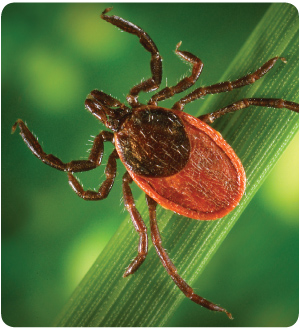In Michigan, Lyme Disease is an Emerging Summer Health Danger
AS THE WEATHER warms, it is important to take precautions against mosquito and tick bites. The Michigan Department of Community Health (MDCH) recommends that people, especially those spending time outdoors and children at camps, take precautions to protect themselves from mosquito or tick-borne diseases.
Last year, West Nile Virus was responsible for 36 illnesses and 2 fatalities reported in Michigan. Seasonal activity varies from year-to-year, but mosquitoes in Michigan can carry illnesses such as West Nile virus (WNV) and Eastern Equine Encephalitis (EEE). Ticks can carry illnesses such as Lyme disease and Rocky Mountain spotted fever.
Mosquito and tick-borne diseases can cause mild symptoms, severe infections requiring hospitalization, and even death.
Adults who are 50 and older have the highest risk of illness caused by West Nile Virus. In addition to presenting a greater risk for older people, EEE is more likely to cause illness in children 15 years of age or younger. People in outdoor occupations such as construction and landscaping are at increased risk of getting bitten, but the mosquito that carries WNV likes to get indoors, as well.
Protect against mosquito bites by remembering to:
- Avoid mosquito bites: Use insect repellent when outdoors especially from dusk to dawn. Look for EPA-labeled products containing active ingredients, such as DEET, Picaridin, or oil of lemon eucalyptus. Reapply as needed according to label directions. Use nets or fans around outdoor eating areas to keep mosquitoes away.
- Mosquito-proof homes: Fix or install window and door screens and cover or eliminate empty containers with standing water where mosquitoes can lay eggs.
- Help your community: Report dead birds to Michigan’s Emerging Diseases website (www.michigan.gov/emergingdiseases) to help track WNV and support community-based mosquito control programs.
Michigan is also home to a number of tick species that will bite people. Ticks are typically found in wooded or brushy areas with tall grass and leaf litter. The ticks most commonly encountered by people in Michigan include the American dog tick which can carry Rocky Mountain spotted fever, and the blacklegged tick which can spread a number of illnesses, including Lyme disease.
Lyme disease is considered to be an emerging disease due to the expansion of tick populations in Michigan’s western Upper and Lower Peninsulas and is the most common tick-borne disease reported in the state with 165 human cases reported in 2013, an increase of almost 60 percent from the previous year.
The period from June to September is of concern because of the poppy-seed sized nymphal-stage tick, which is responsible for much of the Lyme disease in the U.S. While rare, human cases of Rocky Mountain spotted fever have also been documented in Michigan.
Many tick-borne diseases have similar symptoms. Experts recommend that you see a health care provider if you develop signs of illness such as a fever, body aches and/or rash in the days after receiving a tick bite or recreating in tick habitat. Early recognition and treatment can decrease the chance of serious complications. You can prevent tick bites by remembering these easy steps:

Avoid tick-infested areas. This is especially important in May, June, and July. If you are in tick infested areas, walk in the center of trails to avoid contact with overgrown grass, brush, and leaf litter at trail edges.
Use insect repellent. Spray repellent containing DEET or Picaridin on clothes and on exposed skin. You can also treat clothes (especially pants, socks, and shoes) with permethrin, which kills ticks on contact or buy clothes that are pre-treated. Permethrin can also be used on tents and some camping gear. Do not use permethrin directly on skin. Always follow the manufacturer’s instructions when applying any repellents.
Bathe or shower. Bathe or shower as soon as possible after coming indoors (preferably within two hours) to wash off and more easily find ticks that are crawling on you. Ticks can get a ride indoors on your clothes. After being outdoors, wash and dry clothing at a high temperature to kill any ticks that may remain on clothing.
Perform daily tick checks. Always check for ticks after being outdoors, even in your own yard. Ticks must usually be attached for at least a day before they can transmit the bacteria that cause Lyme disease, so early removal can reduce the risk of infection. To remove an attached tick, grasp the tick firmly and as closely to the skin as possible. With a steady motion, pull the tick’s body away from the skin. Do not be alarmed if the tick’s mouthparts remain in the skin. Cleanse the area with an antiseptic.

